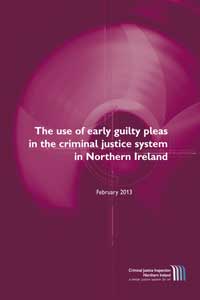
'Improve how early plea process is managed in Northern Ireland' say Inspectors
A new inspection report by Criminal Justice Inspection Northern Ireland (CJI) has examined how early guilty pleas are used by the criminal justice system in Northern Ireland.
The report, published today (Wednesday 13 February), examined the benefits early guilty pleas could provide for victims and witnesses by avoiding the need for a trial, and for offenders by improving the speed at which cases could be dealt with and offending behaviour programmes could commence.
“The use of early guilty pleas is a sensitive matter and public perception is that sentencing is often too lenient and that lenience often works in favour of the offender rather than providing justice for victims,” said Brendan McGuigan, Chief Inspector of Criminal Justice in Northern Ireland.
“However, this inspection revealed there was increased public support for sentence reductions if an early guilty plea is entered at the earliest point, where the benefits both emotional and economic are clearly tangible, as opposed to a guilty plea made at the court door or after a trial has started," he said.
Facilitating an individual who fully admits their guilt at the earliest opportunity to be fast tracked through the criminal justice process, the Chief Inspector indicated, was central.
“Unfortunately this is not always the case and entering an early guilty plea and getting a case to court for hearing and disposal has become a complex and protracted process. Inspectors found overwhelming support for early guilty pleas among the vast majority of people, therefore it is essential to improve how this process is managed and operates in reality,” he said.
To facilitate this development, CJI has urged the Department of Justice to deliver and oversee the development of a clear early guilty plea scheme for both the Magistrates’ and Crown Courts in Northern Ireland.
This work would be supported by the reform of existing committal procedures, case management and improvements in the collection and sharing of data.
The Chief Inspector indicated that reform of the criminal legal aid fee structure in Northern Ireland would also be beneficial.
“During this inspection, CJI Inspectors heard concerns and evidence that incentives may exist to delay plea hearings which attract a higher fee or to escalate matters to a contest or to the Crown Court, where enhanced fees would be payable,” said Mr McGuigan.
“Inspectors have therefore recommended the creation of a single legal aid fee structure in the Magistrates’ Courts and similar fee structures for the Youth and Crown Courts, but recognising some noteworthy differences in the latter.
“These changes, coupled with the principle of the removal of incentives to prolong cases being dealt with in the Crown Courts, would be beneficial and assist in delivering a reduction in the additional costs incurred by the public purse when an offender chooses to change their plea to guilty later in the criminal process," Mr McGuigan said.
In conclusion, the Chief Inspector said that the use of early guilty pleas could have a positive impact delivering significant benefits for victims, witnesses, offenders and the public purse.
“They can help minimise the anxiety experienced by victims and witnesses when faced with the possibility of giving evidence at trial; provide clarity for an offender in terms of sentencing and access to offending behaviour programmes and reduce the additional costs incurred when an accused person chooses to alter their plea later in the criminal justice process,” he said.